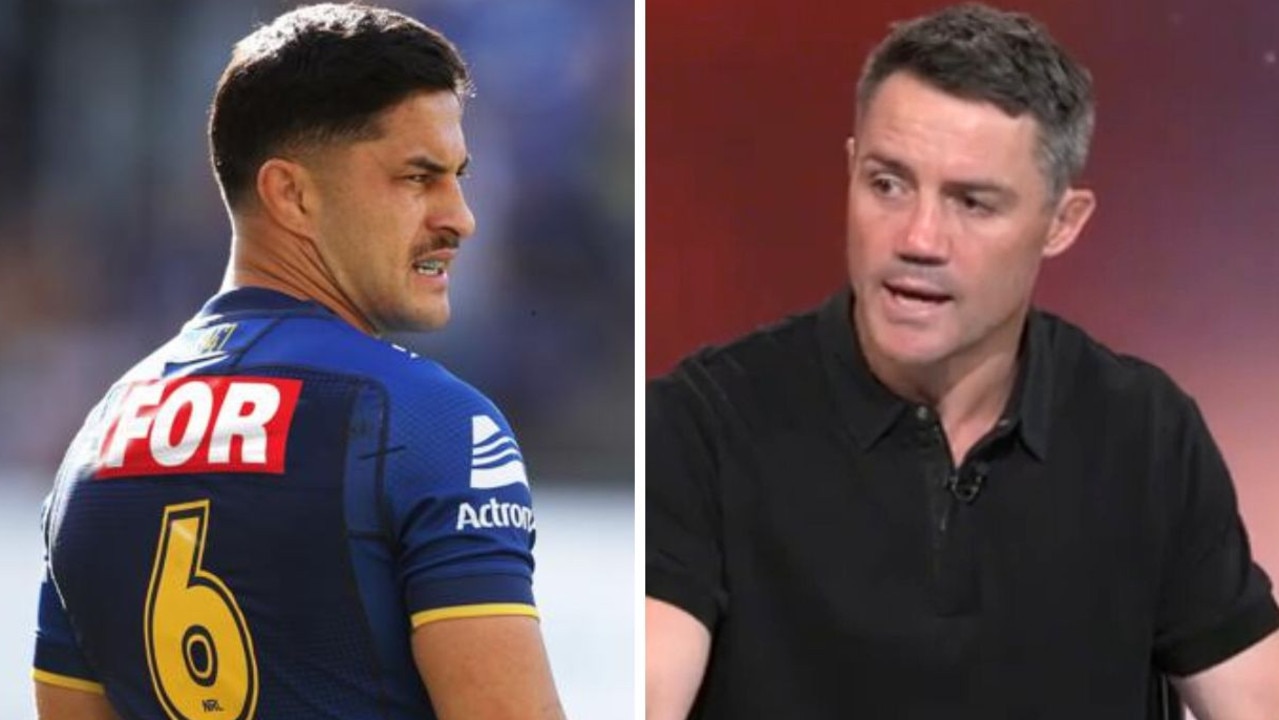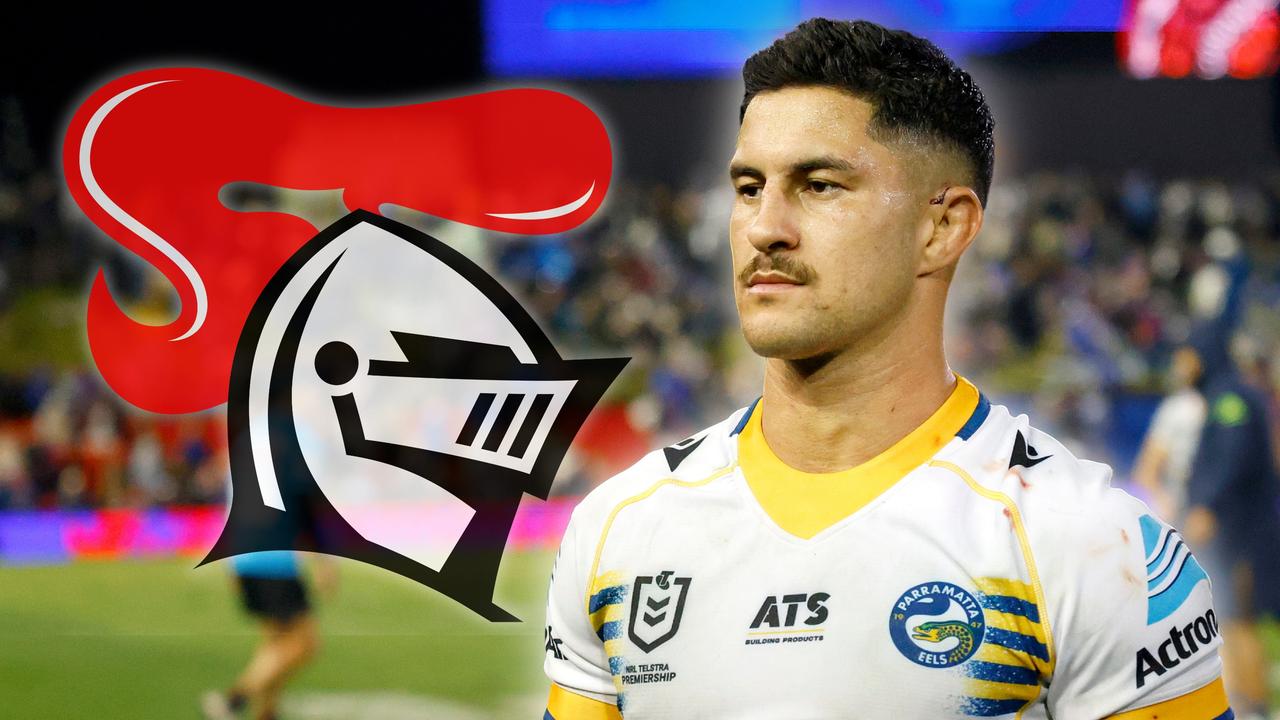How the Parramatta Eels salary cap breaches were found out
REVELATIONS concerning third-party agreements and salary cap breaches have left Parramatta chairman Steve Sharp facing his toughest test.
Eels
Don't miss out on the headlines from Eels. Followed categories will be added to My News.
- Eels’ D-Day plan for losing points
- Eels ‘not for sale’
- Parramatta Eels: Secret text messages have club officials on the hook
AS a rugby league player, Steve Sharp had a reputation for bone-crunching toughness. The hard-tackling second-rower was an integral part of a legendary Parramatta Eels side that won three straight premierships in the early 1980s, in a team that also included Peter Sterling, Brett Kenny and Mick Cronin.
But as Eels chairman since May 2013, Sharp faces tougher challenges than anything he confronted on the paddock.
News that Eels marquee signing Kieran Foran is taking an indefinite leave of absence from the game for personal issues was just the latest blow.
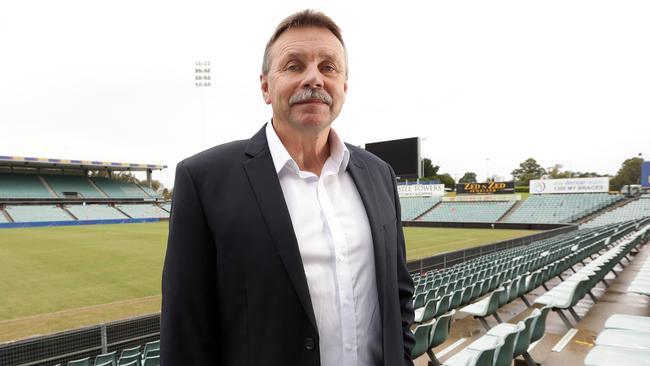
The NRL are in the final hours of a forensic investigation into the Eels after a series of Daily Telegraph front pages alleging the Eels have established a culture of flouting the code’s salary cap rules to compensate players.
The question on the lips of everyone in the game is how Sharp, and his board and management, will fare from the NRL’s forensic scalpel — with widespread speculation about their futures at the club, a likely loss of points and possible financial penalties.
To top things off, the board will front a fiery AGM on Monday night, with salary cap allegations front and centre.
Two days after The Telegraph’s first allegations in March, it was announced that NRL Integrity Unit boss Nick Weeks was sending a team of auditors to the club to profile the fixed computers, mobile phones and iPads of club officials. The NRL even seized hard drives from the Eels’ HQ for detailed examination.
These extraordinary developments are a far cry from the new dawn promised by Sharp and his team when they successfully campaigned for the vote of Parramatta members in May 2013.
One quote from Sharp’s board election campaign back then has stuck in observers’ minds. “The members and supporters of the Eels deserve better and I am determined to push the club forward into a new era of stability and good governance,” Sharp said then.
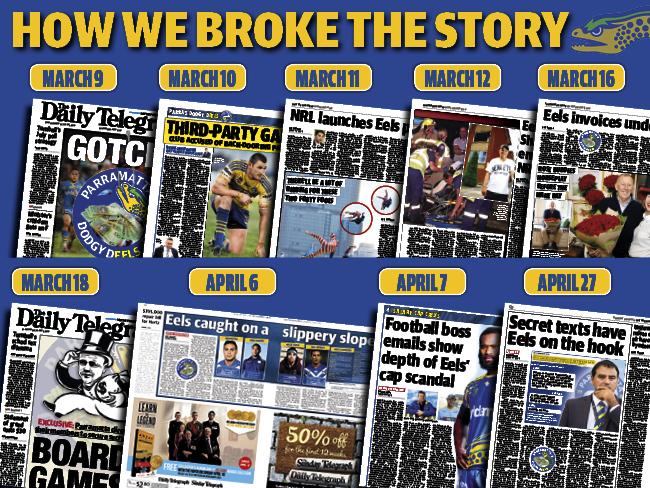
Three years into his reign, some Parramatta members question if Sharp could now apply the very same statement to his own tenure.
The key theme of two months of revelations is the allegation the club used Third Party Agreements to pay players far more than would otherwise have been allowed under NRL salary cap rules.
Why is this an issue? Because the integrity of the NRL is dependent on a level playing field among all 16 clubs. As one rugby league source put it this week: “The salary cap works. The reason that the competition has been so even in recent years is because the quality of players available to each team is evened up by the cap.”
But the allegation of The Telegraph’s many articles is that the NRL’s salary cap rules are not being observed on many levels at the Eels.
Internal materials from the club since Sharp took office in 2013 — including board minutes, emails, text messages, PowerPoint presentations, Excel spreadsheets and player payment schedules — suggest that under his watch, breaches of cap rules at the Eels have become systemic.
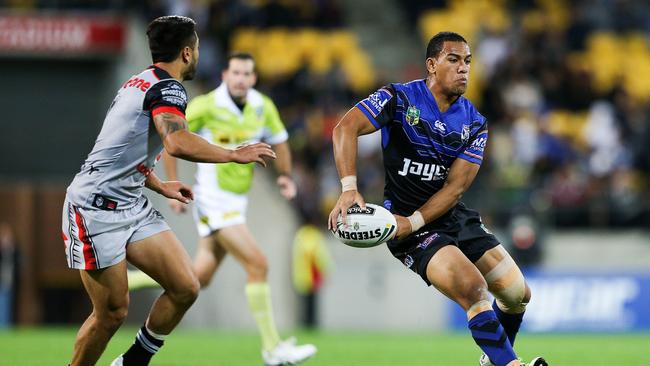
Board minutes from March 2014 — 10 months into Sharp’s administration — show the Eels board was discussing the use of the club’s corporate boxes to reward third parties at its own board meetings, noting “the importance of servicing TPA providers accordingly with hospitality and player appearances”.
There is a big problem with what was being discussed in these board meetings. It is a clear breach of salary cap rules for clubs to reward or compensate companies who provide TPAs to players, which are meant to be at an arm’s length basis from teams.
The implication of those minutes — signed off by Sharp himself — was the board was anything but arm’s length from the TPAs.
When The Telegraph confronted Sharp with the minutes on March 8, he hinted at fraud, suggesting they had been “doctored”. But asked if his signature was forged in the minutes, he backed away.
“I wouldn’t suggest someone has forged my signature at all (but) for what agenda is someone giving you those documents?” he asked.
Over the next seven weeks, the Eels chairman has not made himself available for any more interviews with The Telegraph. Instead, Sharp and Eels CEO John Boulous have issued multiple press releases blaming “previous administrations” and management for the cap problems, despite the fact virtually all of the documents uncovered dated from his chairmanship.
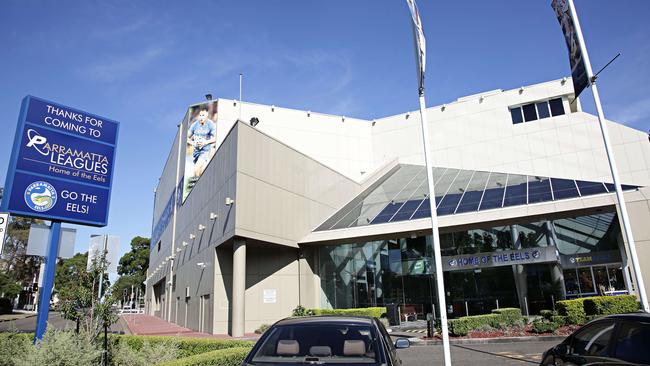
Sharp’s attempts to offload responsibility for the club’s woes to past boards and management have met with a stinging response from the man who ushered in the salary cap — highly respected former League boss John Quayle, who suggested that any board blaming others for problems that happened under its watch was “living in fantasyland”.
“You’ll never stop the officials that think they’re smarter than the rules,” Quayle said.
“We’ve seen it with the Canterbury Bulldogs case (in 2002), in the Melbourne Storm’s case (in 2010) and now in Parramatta’s case.”
Meanwhile, the evidence of the club’s use of corporate hospitality to reward TPA providers has mounted. Rouse Hill Village shopping centre owner Jack Iori — who provided $20,000 TPAs to both Jarryd Hayne and Will Hopoate in 2014 and 2015 — was able to access free corporate hospitality at Eels games “at call”. “I thought it was legal,” Iori said.
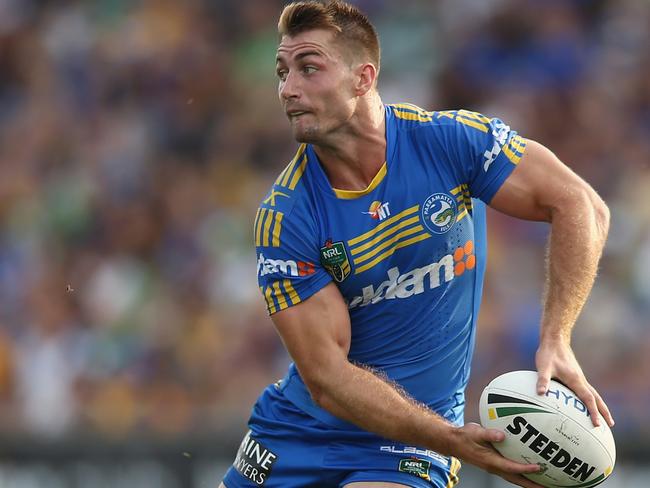
A property agent known for frequent appearances in corporate boxes at Eels home games provided an apartment in Telopea for former player Richie Fa’aoso. And other third-party providers enjoyed similar hospitality, with Eels CEO John Boulous generously hosting Eels TPA providers. Last year he was given an allocation of about 50 corporate box tickets per game, worth up to $180,000 a year, internal documents show. A spokesman for Mr Boulous had no comment when he was asked about this last month.
Meanwhile, further board minutes from January 2014 — again signed off by Sharp — indicate the Eels board actively discussed the sourcing of nearly $600,000 in TPAs: “The board noted that for 2014 there is in the order of $589k in TPA’s (sic) plus 2 cars that are outstanding and need to be secured.”
One Microsoft Word document prepared by a senior club official from the end of the 2013 season detailed specific TPA amounts owed to individual players, complete with rapidly looming deadline dates. Players owed TPAs in the document included Corey Norman ($36,000), Chris Sandow ($10,000), Willie Tonga ($25,000), Will Hopoate ($7000), Justin Hunt ($25,000), Lee Mossop ($20,000), Nathan Peats ($30,000), Reni Maitua ($25,000) and Cheyse Blair ($26,000).
Earlier this month, the club had no comment on this document. But there were internal emails from early 2014 pointing to the club guaranteeing TPA payments to players over multiple years as part of player contracts.

February 2014 emails from Eels football boss Daniel Anderson show he prepared Eels deputy chairman Tom Issa for discussions to directly negotiate club captain Tim Mannah’s three-year contract with the club, including a guaranteed, three-year TPA worth $225,000, or $75,000 a season. Not exactly “arm’s length”.
Meanwhile, it emerged that suspect invoices were allegedly used to hide some third-party payments to players.
The Telegraph alleged that a clothing company, Zibara Clothing, issued inflated invoices to Parramatta totalling tens of thousands of dollars, despite the fact that in some cases, no goods and services were provided in exchange for the money.
One payment of about $15,000 was allegedly made to Zibara Clothing, despite no goods or services being provided in exchange for the money. Instead, the proceeds were allegedly used by the Eels to make a third-party payment to former Eels player Daniel Harrison as part of a package that saw him depart the club in 2014 to Manly. Contacted last month about the payment, Zibara had no comment. An Eels spokesman said it “would include these matters as part of the internal investigation”.

Finally, this week, text messages revealed that Boulous was actively involved in talks about a $75,000 TPA with Parramatta Council, whereby Mannah, Peats and Hopoate would become “ambassadors” for the council.
Parramatta councillor Pierre Esber confirmed he was in discussions with Boulous over several months between July and October 2014 about the TPA, despite Boulous’s later claim he only organised “introductions”.
The deal was ultimately shelved by the council because it did not represent value for ratepayers’ money.
There is no suggestion that any of the third party providers to the club mentioned in this article, including Zibara, Jack Iori and Parramatta Council, or any players mentioned in this story, did anything wrong.
On April Fool’s Day this month, the Eels chairman issued one of his customary press statements: “The recent and disturbing calculated ‘smear’ campaign aimed at your Board is very disappointing.”
But Sharp’s judgment day is approaching.
On Tuesday, both the NRL and Eels members will decide whether The Telegraph’s revelations over two months are a “smear” — or evidence of the failure of accountability and good governance at the Eels.

